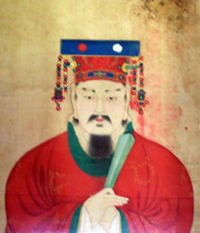Gyeongju
Gyeongju is a city located in the southeastern part of South Korea, known for its extensive historical and cultural heritage. It was the capital of the ancient kingdom of Silla for about one thousand years (57 BC – 935 AD). Today, Gyeongju is often referred to as "the museum without walls" due to its vast number of archaeological sites and cultural properties. This city is a significant tourist destination, attracting visitors interested in the history of Korea and East Asia.
History
Gyeongju's history is deeply intertwined with the rise and fall of the Silla kingdom. As the capital, it was the political, cultural, and religious center of Silla. The city is home to numerous UNESCO World Heritage Sites, including the Bulguksa Temple, Seokguram Grotto, and the Gyeongju Historic Areas, which encompass royal tombs, ancient ruins, and Buddhist statuary, reflecting the city's rich historical legacy.
Geography
Gyeongju is situated in the southeastern part of the Korean Peninsula, bordered by mountains to the west and the East Sea to the east. The city's geography has played a significant role in its historical development, providing natural fortifications and influencing the Silla kingdom's political and military strategies.
Cultural Heritage
The cultural heritage of Gyeongju is vast and varied, encompassing ancient tombs, temples, palaces, and pagodas. Key sites include:
- Bulguksa Temple: A masterpiece of Buddhist art and architecture, renowned for its wooden structures and intricate stone carvings.
- Seokguram Grotto: A hermitage and part of the Bulguksa temple complex, housing a magnificent statue of Buddha looking out to sea.
- Cheomseongdae Observatory: Considered the oldest surviving astronomical observatory in East Asia, reflecting the advanced scientific knowledge of the Silla period.
- Anapji Pond: An artificial pond in the Gyeongju National Park, part of the palace complex, designed for leisure and to reflect the beauty of the natural and man-made landscape.
Economy
The economy of Gyeongju is primarily based on tourism, with its historical sites attracting millions of visitors annually. Additionally, the city has developed industries related to cultural products and traditional crafts, as well as modern sectors such as information technology and manufacturing.
Education
Gyeongju is home to several universities and colleges, focusing on a wide range of disciplines, including humanities, sciences, and engineering. These institutions play a crucial role in preserving the city's cultural heritage through research and education.
Transportation
The city is well-connected by road and rail, including high-speed train services that link Gyeongju to major cities in South Korea, such as Seoul and Busan. This accessibility makes it convenient for both domestic and international tourists to visit.
Conclusion
Gyeongju stands as a testament to the rich cultural and historical heritage of South Korea. Its preservation of Silla kingdom relics offers invaluable insights into ancient East Asian civilization. As a living museum, Gyeongju continues to fascinate and educate visitors from around the world.
This article is a South Korea location stub. You can help WikiMD by expanding it!
Transform your life with W8MD's budget GLP-1 injections from $125.
W8MD offers a medical weight loss program to lose weight in Philadelphia. Our physician-supervised medical weight loss provides:
- Most insurances accepted or discounted self-pay rates. We will obtain insurance prior authorizations if needed.
- Generic GLP1 weight loss injections from $125 for the starting dose.
- Also offer prescription weight loss medications including Phentermine, Qsymia, Diethylpropion, Contrave etc.
NYC weight loss doctor appointments
Start your NYC weight loss journey today at our NYC medical weight loss and Philadelphia medical weight loss clinics.
- Call 718-946-5500 to lose weight in NYC or for medical weight loss in Philadelphia 215-676-2334.
- Tags:NYC medical weight loss, Philadelphia lose weight Zepbound NYC, Budget GLP1 weight loss injections, Wegovy Philadelphia, Wegovy NYC, Philadelphia medical weight loss, Brookly weight loss and Wegovy NYC
|
WikiMD's Wellness Encyclopedia |
| Let Food Be Thy Medicine Medicine Thy Food - Hippocrates |
Medical Disclaimer: WikiMD is not a substitute for professional medical advice. The information on WikiMD is provided as an information resource only, may be incorrect, outdated or misleading, and is not to be used or relied on for any diagnostic or treatment purposes. Please consult your health care provider before making any healthcare decisions or for guidance about a specific medical condition. WikiMD expressly disclaims responsibility, and shall have no liability, for any damages, loss, injury, or liability whatsoever suffered as a result of your reliance on the information contained in this site. By visiting this site you agree to the foregoing terms and conditions, which may from time to time be changed or supplemented by WikiMD. If you do not agree to the foregoing terms and conditions, you should not enter or use this site. See full disclaimer.
Credits:Most images are courtesy of Wikimedia commons, and templates, categories Wikipedia, licensed under CC BY SA or similar.
Contributors: Prab R. Tumpati, MD





